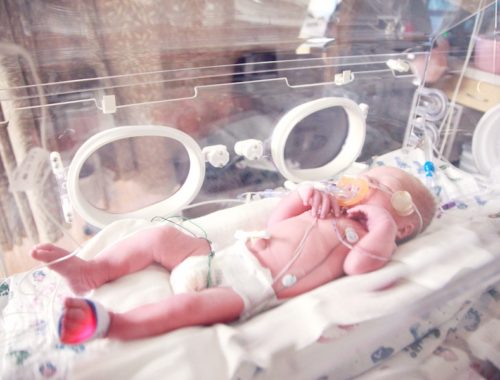How are you feeling?” I ask my friend Christine. She sits next to me in the cozy dining room of The Pantry Vegetarian Tea Room in the Glebe. Her large belly presses up against the table as she leans forward.
“I’m doing great!” she says. “But I could do without the kidney stones!”
It’s a conversation I could see myself having with any girlfriend expecting a baby – gossiping about the highs and lows of pregnancy while we devour some comfort food at a local restaurant.
But this isn’t just any girlfriend expecting a baby. With us is Heather Dunbar, the mother of the baby Christine is carrying. Or rather, Heather is the intended parent (IP), a term used in the surrogacy world. And so the conversation veers away from kidney stones and ligament pains, and dives right into the issue of surrogacy here in Canada.

As a Birth Doula and Childbirth Educator, I have watched the surrogacy “industry” from afar, marveling at the women who give up their bodies (and part of their lives) to give birth to another person’s baby. And sometimes I ask myself, could I do the same? In the past I’ve done Google searches to try to learn more, but often get confused by the sparse information.
It was around the time I started to consider surrogacy that I met Christine Crook at a local Ottawa doula meeting. She had just recently gone through a surrogacy journey with a couple, which ended in disappointment after three attempts at IVF. Not put off by this experience, Christine continued to hold out hope that one day she would successfully give the gift of a baby to another couple.
How Does Surrogacy Work Here In Canada?
In 2004, the government passed the Assisted Human Reproduction Act, which made it illegal for any person or couple to pay a woman to carry her child. In other countries, women can be paid thousands of dollars to carry a surrogate baby. In Canada, surrogates can be reimbursed for expenses (e.g. travel related to treatments, maternity clothes etc.), and these expenses are clearly laid out in a legal contract between the IPs and surrogate.
“But finding a surrogate can be a difficult process,” Heather tells me. When Heather and her husband Craig learned that she would not be able to carry a baby, they began to consider surrogacy. They had seven embryos to work with already, and felt hopeful that they could find someone.
Heather first worked out the costs. There are several surrogacy agencies here in Canada, which charge couples $5,000 (or more) to sign up. Couples then get access to a registry of willing surrogates, who have been vetted by the organization. On top of the initial fee, couples are also responsible for lawyer’s fees and a wide range of expenses. When all is said and done, the total cost to go through an agency can be up to, or exceeding, $70,000. The cost varies depending on whether it is the surrogates first time or if she is experienced. Other costs can include hundreds of dollars in travel expenses, as there is no guarantee that the surrogate will be located in the same city – let alone the same province.
Costs aside, there’s the challenge of finding a suitable surrogate. And sadly, there are many more IPs out there then there are willing surrogates.
Finding The Right Match
“It took us less than 2 months to find Christine,” Heather tells me, with a sheepish look on her face. And no wonder. Some couples spend years searching for a surrogate, and others are never successful.
A chance encounter in an M&M’s Meat Shop led Heather to Christine, and they tell me about their first meeting like lovers describing a first date.
“I just knew she was the one” says Heather.

“We connected so well, and immediately we all felt really comfortable with each other” says Christine.
Instead of going through an agency, Heather and Craig stumbled on their surrogate match by kismet. Many couples are now attempting to use word-of-mouth to find women who may be a willing, and suitable, match to carry a child. Some are reaching out on social media, in heartfelt campaigns that will ultimately guide them to their match.
Not Your “Typical” Surrogate
And so one meeting led to the next, and Christine soon found herself at the Ottawa Fertility Centre to start the process.
I was surprised to hear that surrogates need “permission” to carry a baby. Fertility centres have every right to deny treatment to IPs and surrogates, if they feel that the health and well-being of the surrogate is in some way compromised.
At age 43 and with two grown children at home, Christine is not a typical surrogacy candidate. Labeled as a patient with “advanced maternal age,” Christine has another point against her when she reveals that she is on anti-depressant medication.
“I’ve always been very open about my mental health issues,” says Christine. “I tried to find a couple to carry for through one of the Canadian surrogacy agencies, but no one would take me because they usually look for women who aren’t taking any medication.”
Heather and Craig Dunbar are no strangers to the medical world of tests, needles and medications. In 2014, Craig embarked on a social media campaign to find a kidney donor, after six years on dialysis. The couple were overjoyed when a donor (who happened to be a friend of Craig’s) was found, and Craig underwent his kidney transplant. After the dust had settled and Craig had recovered, the couple then decided to start a family. Due to fertility issues, Heather soon found out she was unable to carry a child.
“We weren’t overly concerned about the medication Christine was on, as we discussed it with the doctor ahead of time and felt completely comfortable with it,” says Heather. We just felt so lucky to have found someone like Christine!”
And so Christine is poked and prodded, and submits to a full psychological evaluation. The surrogacy world can sometimes (although rarely) attract women who are troubled, and the doctor’s goal is to shed light on these issues as early as possible. Surrogates need to be of sound mind and judgment – IVF, pregnancy, and postpartum is not always a smooth journey.
Related
Adoption in the Workplace
What is Safe During Pregnancy?
How to Take a Home Pregnancy Test
Making A Baby
Found to be in perfect health, Christine underwent the IVF process twice. The first embryo did not “stick” (the lingo for an embryo that does not take to the uterus.) But the second?
“We’re told not to use a pregnancy test to confirm the results,” says Christine. “But everybody does anyway.”
And so on the morning of June 30th (two weeks after the transfer,) Christine peed on the stick. She did not look at the result window, and put the stick back into the box. Heather and Craig came over that evening and Christine handed the stick to them. It was their news to discover first – good or bad. The look on Heather’s face told everyone!
Positive. This baby had stuck.
Christine and Heather were fortunate that they lived in such close proximity. Some surrogates are hundreds or thousands of miles away from the IPs. Heather was able to attend all the ultrasound and midwifery appointments with Christine.
Having A Baby

It’s evident in meeting with them that the relationship between Heather and Christine is a close one. They share a bond that is rarely shared between women in our society, and I can see the look of deep connection between them. This surrogacy journey is not a one-way street. They are both sharing in the joy of this gift of life, and they are both reaping the rewards.
This is never more evident than it is after you look at the gorgeous photographs taken by Kim Brooks of Breathe In Photography, who was there to document the birth (although story goes that she almost didn’t make it on time!)

On February 11th , 2016, baby Clara Ann came into this world. She was birthed in a tub by Christine, and welcomed into the arms of Heather, who jumped into the tub to catch her baby. My favourite picture is one where Christine holds Clara’s tiny fingers, creating a line of connection between her and Heather. Craig sits close to the tub, witnessing the ecstasy of his daughter’s birth – and the joy and stillness, which settles into the space after this tiny miracle baby takes her first breath.

The Gift Of Life
I’m no closer to making a decision about surrogacy, and I trust in the universe to tell me whether it is the path for me. At 35, I think I have some time to decide.
What I DO know is that my friend’s journey is something that needs to be shared. If there are other women out there who read this and feel that small tug….that small voice that says “could I do that?”…I want you to know that it is possible.
And it’s more than just possible – it’s magnificent.
Previously published at Kids in the Capital. Photo credit: Kim Brooks from Breathe In photography
Misty Pratt is the Community Manager for Kids in the Capital. For the past five years she has enjoyed a part-time career as a birth doula and childbirth educator with the Ottawa Childbirth Education Association. In her full-time life she is a mother, health researcher and budding yogi.





[…] you’re thinking about starting a family. And you’re trying to start a family. And trying. And trying. And you’re at the point where, if one more person tells you to “relax” so “it will just […]